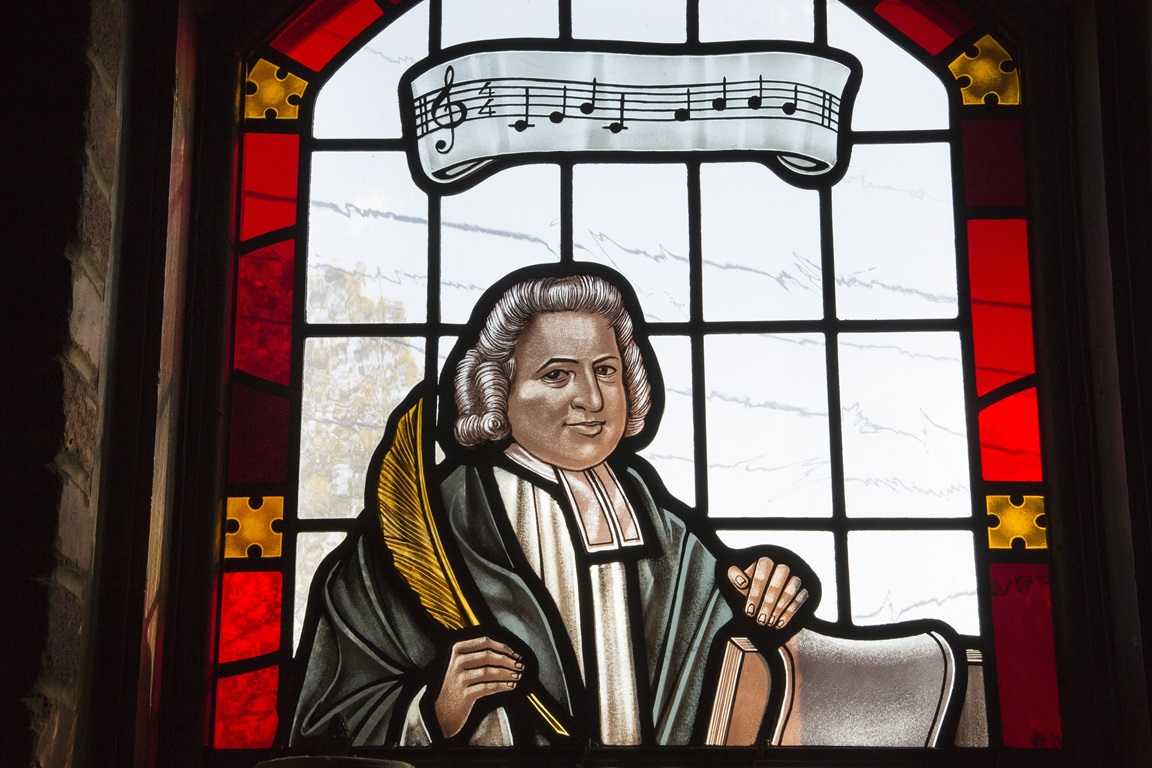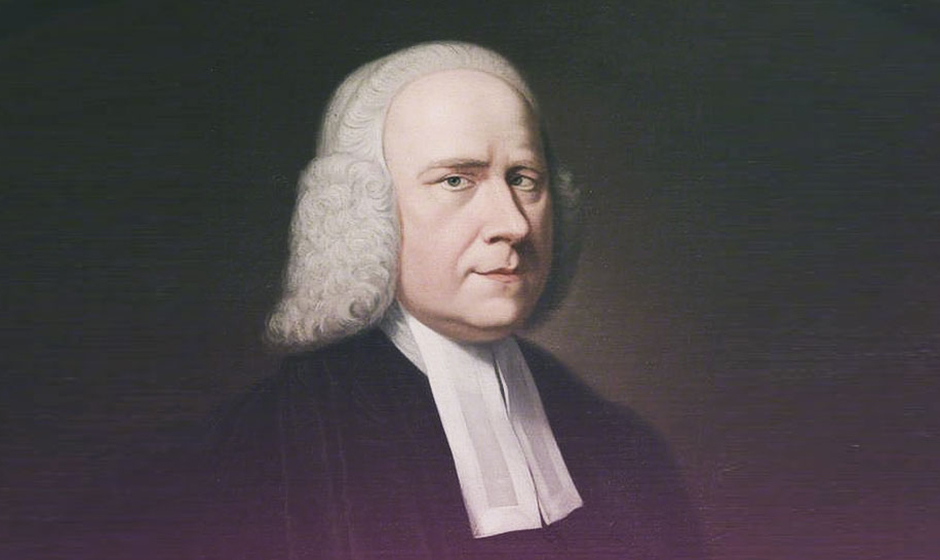
In 1739, Charles Wesley’s “Hymn for Christmas-Day” was included in the first Methodist hymnal, “Hymns and Sacred Poems.” It began, “‘Hark how all the welkin rings, ‘Glory to the King of kings.'”
I confess that I had to look up “welkin”! The online resource Wiktionary traces this twelfth century English word from the Middle English welken (“cloud; sky; weather (?); heavens; (astronomy) cosmic elementary, planetary, or celestial sphere; all the spheres beyond the elementary region, including the primum mobile”), Old English wolcn (“cloud”), Proto-West Germanic *wolkn (“cloud”), and ultimately, from Proto-Indo-European *welg- (“damp; wet”). So–Charles had in mind a shout of praise that would make the heavens ring!

In 1753, evangelist George Whitfield proposed an alteration to the first line, which Charles’ brother John, who was editing the hymnal at the time, accepted. Whitfield’s altered wording, and so the hymn’s new title, stuck. The result was our familiar carol, “Hark! the Herald Angels Sing.”
The stirring, familiar tune of this carol is also not original. It comes from “the second chorus of Felix Mendelssohn’s (PHH 279) Festgesang (Op. 68) for male voices and brass. . . first performed in 1840 at the Gutenberg Festival in Leipzig”–nearly a century after Charles wrote his carol!
Some other lines from Charles Wesley’s original hymn have been altered in the 1989 United Methodist Hymnal, where the words to Charles’ Christmas hymn are:
Hark! the herald angels sing,
“Glory to the newborn King:
peace on earth, and mercy mild,
God and sinners reconciled!”
Joyful, all ye nations, rise,
join the triumph of the skies;
with th’angelic hosts proclaim,
“Christ is born in Bethlehem!”
Refrain:
Hark! the herald angels sing,
“Glory to the newborn King”
Christ, by highest heaven adored,
Christ, the everlasting Lord,
late in time behold him come,
offspring of the Virgin’s womb:
veiled in flesh the Godhead see;
hail th’incarnate Deity,
pleased with us in flesh to dwell,
Jesus, our Immanuel. [Refrain]
Hail the heaven-born Prince of Peace!
Hail the Sun of Righteousness!
Light and life to all he brings,
risen with healing in his wings.
Mild he lays his glory by,
born that we no more may die,
born to raise us from the earth,
born to give us second birth. [Refrain]

As Ask The UMC, a ministry of United Methodist Communications, observes, Charles Wesley’s original first line “was more biblically accurate. The Bible nowhere records angels singing!” Sure enough, in Luke’s gospel, when the angelic army announces Christ’s birth to the shepherds, they do not sing at all:
Nearby shepherds were living in the fields, guarding their sheep at night. The Lord’s angel stood before them, the Lord’s glory shone around them, and they were terrified. The angel said, “Don’t be afraid! Look! I bring good news to you—wonderful, joyous news for all people. Your savior is born today in David’s city. He is Christ the Lord. This is a sign for you: you will find a newborn baby wrapped snugly and lying in a manger.” Suddenly a great assembly of the heavenly forces was with the angel praising God. They said,“Glory to God in heaven, and on earth peace among those whom he favors” (Luke 2:8-14).
Mostly, the more recent alterations to Charles Wesley’s carol clarify that women as well as men are included. So, in the second verse, Wesley’s “pleased as Man with Men to dwell” becomes “pleased with us in flesh to dwell”–less euphonious, perhaps, but theologically sound as well as satisfactorily and properly inclusive.

Just as Wesley’s first stanza alludes to Luke 2, his third stanza alludes to Malachi 4:1-3 (3:19-21 in the Hebrew), where the coming day of the LORD is described as a day of fiery judgment upon the wicked oppressors of God’s people. But Malachi also declares that that day will be a time of renewal and blessing for God’s faithful, who will be rejuvenated and filled with exuberant joy:
But the sun of righteousness will rise on those revering my name;
healing will be in its wings
so that you will go forth and jump about like calves in the stall (Mal 4:2).
For Malachi, the LORD is “the sun of righteousness,” who rises with “healing. . . in its wings.” The Greek translation of Jewish Scripture, the Septuagint, as well as the Latin Vulgate, have “his wings” (see the KJV), but the Hebrew text and the Targum (the Aramaic version of this text used in early synagogues) have “her wings”–probably with reference to “righteousness,” which is a feminine noun in Hebrew.

For good (for example, Ps 84:11) or for ill (see Ezek 8:16), images of the LORD as the sun, and associations of the sunrise with God’s presence (the Jerusalem temple faced east) are fairly common in Scripture. Indeed, mosaics of the solar chariot (associated in Greco-Roman religion with Apollo or with Sol Invictus) appear in early synagogues at Beth Alpha (shown above), Naaran, Hamath Tiberius, Yafa, and Isfiya.
In Malachi, depicting God’s coming as the sunrise represents a positive counter to the destructive image of the day of the LORD “burning like an oven” (4:1): the coming of the LORD may burn, but it also heals.
For Charles Wesley, Jesus is the “Sun of Righteousness”! The third stanza of his carol originally read:
Hail the Heav’nly Prince of Peace!
Hail the Sun of Righteousness!
Light and Life to All he brings,
Ris’n with Healing in his Wings.
Mild he lays his Glory by,
Born—that Man no more may die,
Born—to raise the Sons of Earth,
Born—to give them Second Birth.
In the United Methodist Hymnal, the latter part of this verse becomes
Mild he lays his Glory by,
born that we no more may die,
born to raise us from the earth,
born to give us second birth.
While I am fully in favor of the use of inclusive language in the United Methodist Hymnal, our editors have erred theologically, I believe, in rendering the next-to-last line of this glorious hymn as “Born to raise us from the earth”–something like “born to raise we folk of earth” would have been far better. Escape from the earth was not Charles Wesley’s intent here! Instead, because Jesus has come to us as one of us, we earthlings, we “sons of earth” in Charles Wesley’s admittedly sexist rendering, may be raised to new life (the “second birth”) right here. Indeed, as Charles’ brother J0hn insisted, we may even attain holiness of heart and life here and now, in this world that Christ has come to save. That is an important distinction, I believe.
Let us join together, friends, as God’s redeemed and reconciled people, in praise to our Lord Jesus! Let us, as Malachi wrote, jubilantly “jump about like calves in the stall,” and may our shouts make the welkin ring!
AFTERWORD:

This Sunday, the fourth Sunday of Advent, is also Christmas Eve! So let this fourth Advent blog also be my Christmas greeting to one and all! Merry Christmas, friends–God bless us every one!
